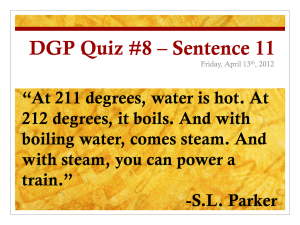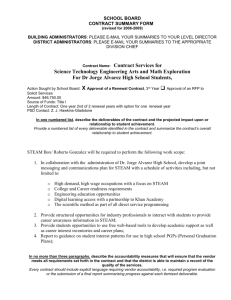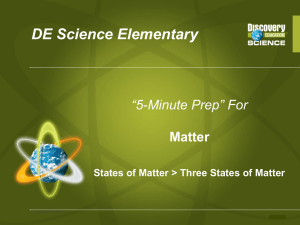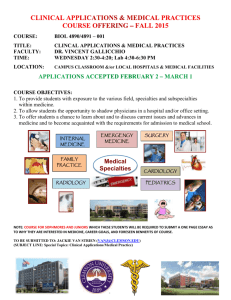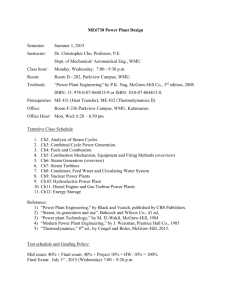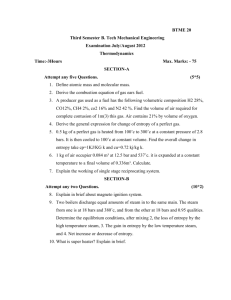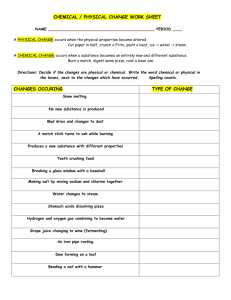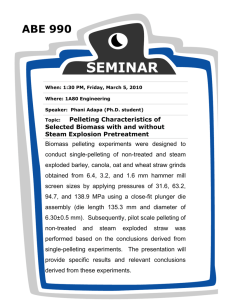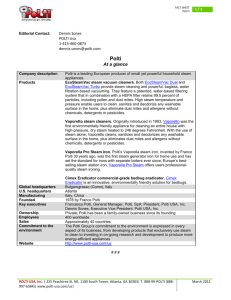ENGINEERING lesson 1
advertisement
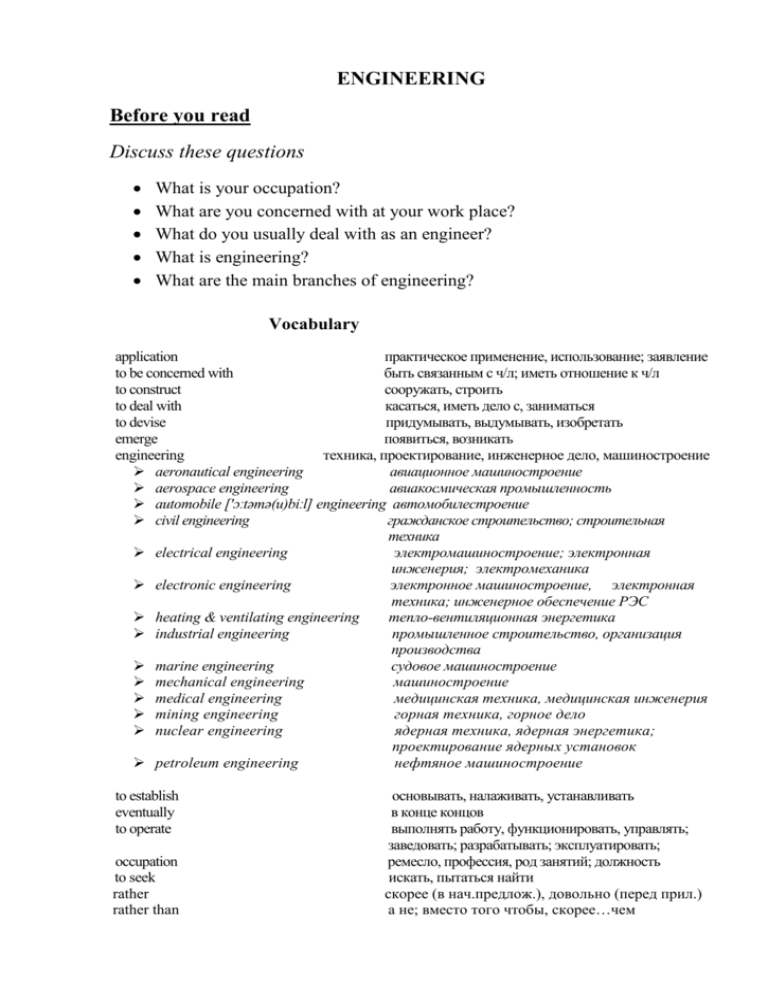
ENGINEERING Before you read Discuss these questions What is your occupation? What are you concerned with at your work place? What do you usually deal with as an engineer? What is engineering? What are the main branches of engineering? Vocabulary application практическое применение, использование; заявление to be concerned with быть связанным с ч/л; иметь отношение к ч/л to construct сооружать, строить to deal with касаться, иметь дело с, заниматься to devise придумывать, выдумывать, изобретать emerge появиться, возникать engineering техника, проектирование, инженерное дело, машиностроение aeronautical engineering авиационное машиностроение aerospace engineering авиакосмическая промышленность automobile ['ɔːtəmə(u)biːl] engineering автомобилестроение civil engineering гражданское строительство; строительная техника electrical engineering электромашиностроение; электронная инженерия; электромеханика electronic engineering электронное машиностроение, электронная техника; инженерное обеспечение РЭС heating & ventilating engineering тепло-вентиляционная энергетика industrial engineering промышленное строительство, организация производства marine engineering судовое машиностроение mechanical engineering машиностроение medical engineering медицинская техника, медицинская инженерия mining engineering горная техника, горное дело nuclear engineering ядерная техника, ядерная энергетика; проектирование ядерных установок petroleum engineering нефтяное машиностроение to establish eventually to operate occupation to seek rather rather than основывать, налаживать, устанавливать в конце концов выполнять работу, функционировать, управлять; заведовать; разрабатывать; эксплуатировать; ремесло, профессия, род занятий; должность искать, пытаться найти скорее (в нач.предлож.), довольно (перед прил.) а не; вместо того чтобы, скорее…чем Read and Translate the Text Text 1 Engineering Engineering is one of the oldest occupations in history. It is often defined as making practical application of theoretical sciences such as physics and mathematics. Many of the early branches of engineering were based not on science but on empirical information that depended on observation and experience rather than on theoretical knowledge. The great engineering works of ancient times were constructed and operated largely by means of slave labor. After the fall of the Roman Empire there were fewer slaves available in Europe. During the Middle Ages people began to seek devices and methods of work that were more efficient and humane. Wind, water, and animals were used to provide energy for some of these new devices. This kind of experimentation eventually led to what is known as the Industrial Revolution which began in the eighteenth century. First steam engines and then other kinds of machines took over more and more of the work that had previously been done by human beings or by animals. James Watt, one of the key figures in the early development of steam engines, devised the concept of horsepower to make it easier for his customers to understand the amount of work his machines could perform. Since the nineteenth century both scientific research and practical application of its results have escalated. The mechanical engineer now has the mathematical ability to calculate the mechanical advantage that results from the complex interaction of many different mechanisms. He or she also has new and stronger materials to work with and enormous new sources of power. The Industrial Revolution began by putting water and steam to work; since then machines using electricity, gasoline, and other energy sources have become so widespread that they now do a very large proportion of the work of the world. One result of the rapid expansion of scientific knowledge was an increase in the number of engineering specialties. By the end of the nineteenth century not only were mechanical, civil, and mining and metallurgical engineering established but the newer specialties of chemical and electrical engineering emerged. This growth in the number of specialties is continuing with the establishment of such disciplines as aerospace, nuclear, petroleum, and electronic engineering. Many of these are subdivisions of earlier specialties - for example, electronic from electrical engineering or petroleum from chemical. Within the field of mechanical engineering the major subdivision is industrial engineering which is concerned with complete mechanical systems for industry rather than individual machines. I. State true or false 1.Engineering is one of the oldest occupations in history. 2.Many of the early branches of engineering were based on theoretical sciences such as physics and mathematics. 3.Slave labor was used in great engineering works of ancient times. 4.During the Middle Ages wind, water and animals were used to provide energy for some new devices. 5. First steam engines were designed in ancient times. 6. The Industrial Revolution began by putting water and steam to work. II. Find in the Text English Equivalents to the Following Russian Sentences 1. Многие древние отрасли инженерного дела опирались не на научные знания, а на эмпирическую информацию, которая зависела от наблюдений и опыта. a не от знаний. 2. И в конце концов такой вид экспериментов привел к тому, что известно сегодня как Промышленная революция, которая началась в ХVIIIвеке. 3. Главное подразделение в машиностроении - это организация производства, которое имеет дело с целыми машиностроительными системами для промышленности, а не с отдельным оборудованием. III. Match words and word combinations with their synonyms 1. Engineering 2. Occupation 3. To deal with 4. To construct 5. To establish 6. Application 7. To operate 8. To devise 9. To emerge 10. Eventually IV. a) set up b) use c) to work d) equipment e) to build f) to be concerned with g) to invent h) at last i) profession j) to appear Give other words with the same root using suffixes – ment, - tion, - ance, -er (or), -ing. An engine, to occupy, to construct, to devise, to establish, to apply, to operate. V. Supply English equivalents Скорее чем; а не Отрасль Обеспечивать Придумывать Появляться Иметь дело с Функционировать Профессия; род занятий В конце концов Устанавливать, налаживать VI. Сооружать, строить Иметь отношение к, быть связанным с ч/л Заниматься, иметь дело с Analyze the underlined sentences ( tell the Tense & Voice used) VII. Ask different questions to them. VIII. Change the sentences using Passive Voice 1. Young people widely apply a variety of digital devices in everyday life. 2. The deviser has eventually created a completely new type of vehicle. 3. Electrical engineering deals with various electrical installations and generators. 4. Data analysis follows data gathering. 5. The invention of a steam engine started the Industrial Revolution. 6. The technological advance will impact the environment. 7. Aerodynamic forces are affecting a flying vehicle while in flight. 8. Mechanical engineers can operate a number of machine – tools. 9. An international team of scientists and engineers is constructing the ISS. 10. We spoke a lot about new forms of engineering occupations at the conference yesterday. IX. Translate into Russian rather than: 1. Within the field of mechanical engineering the major subdivision is industrial engineering which is concerned with complete mechanical systems for industry rather than individual machines. 2. Many of the early branches of engineering were based not on science but on empirical information that depended on observation and experience rather than on theoretical knowledge. 3. These values show rather interesting features. 4. Rather than to facilitate necessary changes these programs hindered them. 5. Rather, I’ll seek a new application of the device.
